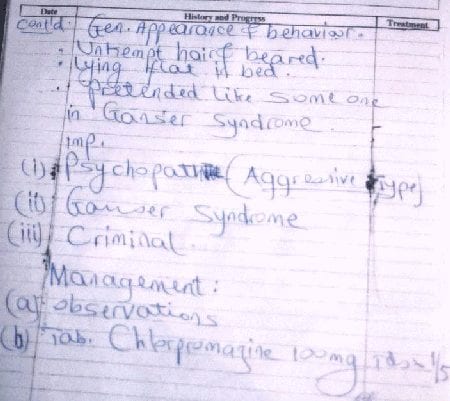The Shrinking Feet of the Man from Malawi
aka Postcards from the Edge 007b
Mr J had traveled across the border to Zambia from Malawi. He had been admitted to hospital overnight. The brief admission note showed that he was in his thirties and had three presenting complaints:
- “hungry”
- “shrinking feet” and
- “does not want to answer anymore questions”
A blood slide showed the presence of malarial parasites, and anti-malarial treatment was started. His feet were measured in an attempt to show objectively that they were of a size typical for a man of his age and stature and that there was no ongoing decrement with time. By the time the doctors saw him the next day he was handcuffed to a bed – he had apparently been “scaring the nurses” during the night. A “psychiatric” referral was arranged.
The psychiatric assessment was summarised by a list of three “impressions” at the bottom of the page:
- “psychopath – aggressive type”
- “Ganser syndrome”, and
- “Criminal”.
“Ganser syndrome –what the @#$% is that?”, I hear you cry in despair. The Oxford Handbook of Clinical Specialties has the following entry under ‘Some unusual eponymous syndromes’:
Disorientation plus pseudodementia with ‘approximate answering’, e.g. an answer to ‘What is the colour of the chair in the corner?’ might be: ‘What corner? I don’t know what a corner is. I don’t see a chair…’ … Often there is a preceding head injury…
He was then administered what seemed the universal treatment for psychiatric illness in Zambia at the time, big doses of chlorpromazine.
The next day he again had three complaints, this time they were:
- “dry mouth”,
- “sleepiness”, and
- “too many drugs, and not enough food”.
It became apparent that Mr J’s main problem was hunger, a consequence of poor crop yields in Malawi that year. As for the diagnosis of malaria, in endemic regions even completely well individuals may have a malarial parasitemia if tested. Mr J’s complaint of ‘shrinking feet’ appeared to be an imaginative strategy for obtaining food by getting admitted to hospital. However his strategy back-fired as it led him into the strange world of an Africa-style ‘One Flew Over The Cuckoo’s Nest’.
Ultimately, Mr J agreed to continue taking his medicines when he was told he would be fed and discharged in a few days. Soon after his discharge he returned begging for money to allow him to travel back to Malawi. A nurse told him that he might be able to hitch a ride on an ambulance returning to a town near the border and he was sent on his way.
LITFL Zambia related notes
- A Change in Condition
- The Shrinking Feet of the Man from Malawi
- A Midsummer Night’s Dream
- World AIDS Day and the Crisis in Zambia

POSTCARDS
from the edge
Chris is an Intensivist and ECMO specialist at The Alfred ICU, where he is Deputy Director (Education). He is a Clinical Adjunct Associate Professor at Monash University, the Lead for the Clinician Educator Incubator programme, and a CICM First Part Examiner.
He is an internationally recognised Clinician Educator with a passion for helping clinicians learn and for improving the clinical performance of individuals and collectives. He was one of the founders of the FOAM movement (Free Open-Access Medical education) has been recognised for his contributions to education with awards from ANZICS, ANZAHPE, and ACEM.
His one great achievement is being the father of three amazing children.
On Bluesky, he is @precordialthump.bsky.social and on the site that Elon has screwed up, he is @precordialthump.
| INTENSIVE | RAGE | Resuscitology | SMACC


